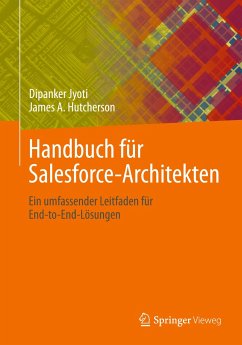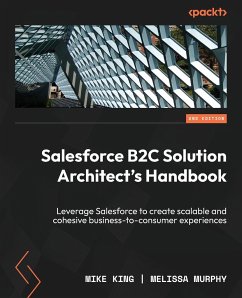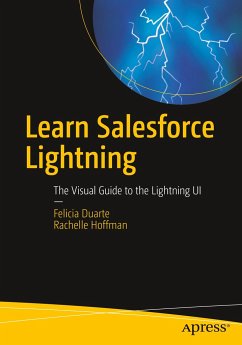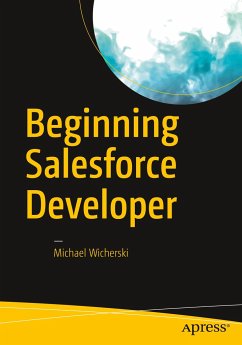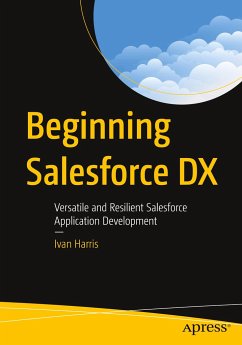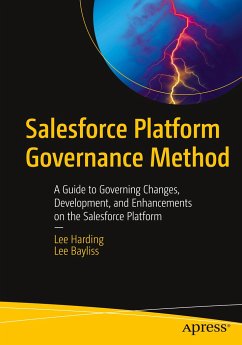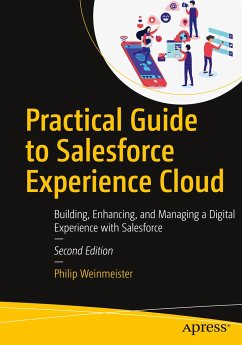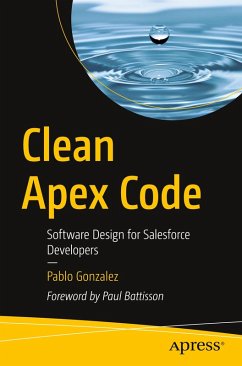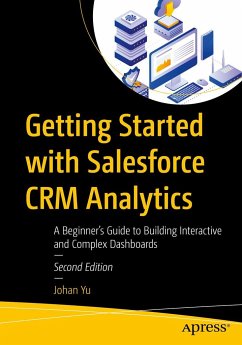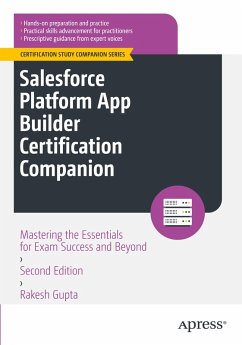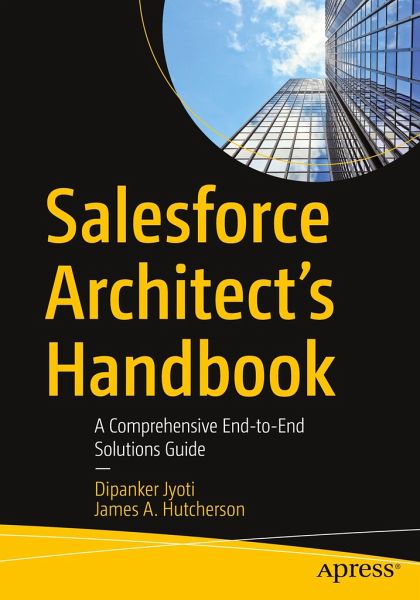
Salesforce Architect's Handbook
A Comprehensive End-to-End Solutions Guide

PAYBACK Punkte
25 °P sammeln!
Take a deep dive into the architectural approach, best practices, and key considerations needed to comprehend, evaluate, and design an efficient, scalable, and sustainable Salesforce-based solution. This book takes a comprehensive look at the seven architectural domains that must be considered when architecting a Salesforce-based solution and equips you to develop the artifacts needed for an end-to-end enterprise architecture blueprint for Salesforce implementation and DevOps.This must-have handbook helps Salesforce professionals implement and manage Salesforce in their organization. You will ...
Take a deep dive into the architectural approach, best practices, and key considerations needed to comprehend, evaluate, and design an efficient, scalable, and sustainable Salesforce-based solution. This book takes a comprehensive look at the seven architectural domains that must be considered when architecting a Salesforce-based solution and equips you to develop the artifacts needed for an end-to-end enterprise architecture blueprint for Salesforce implementation and DevOps.
This must-have handbook helps Salesforce professionals implement and manage Salesforce in their organization. You will learn Salesforce architecture: solution architecture, data architecture, security architecture, integration architecture, identity and access management architecture, and strategies that can be used for Salesforce-based mobile applications.
In addition to the main architecture concepts, the book also offers industry best practices and the recommended framework for approaching, managing, delivering, and continuously improving a Salesforce solution using its Salesforce Development & Deployment Lifecycle.
What You Will Learn
Get a detailed overview of the Salesforce multi-tenant, metadata-driven architectural framework and the under-the-hood technology stack that supports SalesforceKnow the seven architecture domains, their intricacies, and the considerations needed within each when designing a Salesforce solutionHave an architectural mindset and the artifacts needed to architect an end-to-end enterprise-level implementation of SalesforceBe familiar with the most common Salesforce products, licenses, AppExchange products, and the key considerations of using out-of-the-box declarative capabilities vs custom programmatic capabilities of SalesforceUnderstand data architecture design considerations that include data modeling in Salesforce, identifying and mitigating large data volume concerns, and the key considerationsfor data migration and data archiving strategiesUnderstand security architecture considerations related to securing data within Salesforce and the various approaches to allow or restrict sharing and visibility from within SalesforceUnderstand integration architecture considerations that provide an overview of the integration patterns and the integrations solutions that can be used with Salesforce to connect Salesforce with a remote system hosted on-premises, on the cloud, or by third-party solution providersUnderstand identity and access management architectural considerations across the 9 stages of an identity and access management lifecycleBe aware of the strategies available to design mobile solutions with Salesforce and the options available for Salesforce mobile architecture
Employ the principles of the DevOps & Development Lifecycle needed for an ideal state Salesforce implementation
Who This Book Is For
Professionals interestedin implementing, optimizing, and architecting Salesforce solutions enterprise-wide; Salesforce implementation (SI) partners needing a detailed playbook for architecting and delivering successful Salesforce solutions; Salesforce admins, developers, and architects looking for a one-stop educational resource to mastering the Salesforce architect domains or those pursuing the Salesforce architecture domain certification exams, including the Salesforce Certified Technical Architect (CTA) board exam
This must-have handbook helps Salesforce professionals implement and manage Salesforce in their organization. You will learn Salesforce architecture: solution architecture, data architecture, security architecture, integration architecture, identity and access management architecture, and strategies that can be used for Salesforce-based mobile applications.
In addition to the main architecture concepts, the book also offers industry best practices and the recommended framework for approaching, managing, delivering, and continuously improving a Salesforce solution using its Salesforce Development & Deployment Lifecycle.
What You Will Learn
Get a detailed overview of the Salesforce multi-tenant, metadata-driven architectural framework and the under-the-hood technology stack that supports SalesforceKnow the seven architecture domains, their intricacies, and the considerations needed within each when designing a Salesforce solutionHave an architectural mindset and the artifacts needed to architect an end-to-end enterprise-level implementation of SalesforceBe familiar with the most common Salesforce products, licenses, AppExchange products, and the key considerations of using out-of-the-box declarative capabilities vs custom programmatic capabilities of SalesforceUnderstand data architecture design considerations that include data modeling in Salesforce, identifying and mitigating large data volume concerns, and the key considerationsfor data migration and data archiving strategiesUnderstand security architecture considerations related to securing data within Salesforce and the various approaches to allow or restrict sharing and visibility from within SalesforceUnderstand integration architecture considerations that provide an overview of the integration patterns and the integrations solutions that can be used with Salesforce to connect Salesforce with a remote system hosted on-premises, on the cloud, or by third-party solution providersUnderstand identity and access management architectural considerations across the 9 stages of an identity and access management lifecycleBe aware of the strategies available to design mobile solutions with Salesforce and the options available for Salesforce mobile architecture
Employ the principles of the DevOps & Development Lifecycle needed for an ideal state Salesforce implementation
Who This Book Is For
Professionals interestedin implementing, optimizing, and architecting Salesforce solutions enterprise-wide; Salesforce implementation (SI) partners needing a detailed playbook for architecting and delivering successful Salesforce solutions; Salesforce admins, developers, and architects looking for a one-stop educational resource to mastering the Salesforce architect domains or those pursuing the Salesforce architecture domain certification exams, including the Salesforce Certified Technical Architect (CTA) board exam



